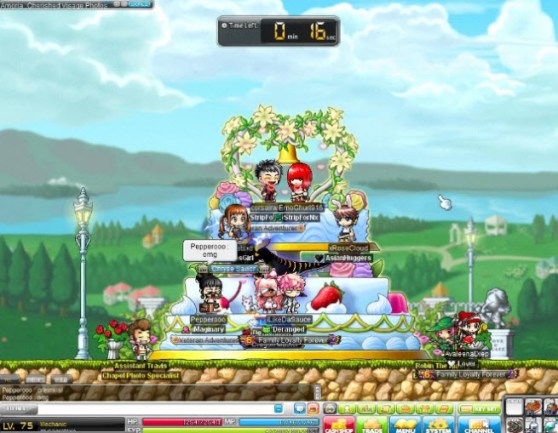Mahoney: Talking about east versus west, there are certainly gameplay taste characteristics that are different. In many cases that exists. In some cases it doesn’t exist at all. What we’re trying to do, when we think about the west, is to merge what we know about online games and creating a user base and building it up over years, and doing free-to-play in the right way. We want to bring that knowledge and do free-to-play right in the west. There are terribly few examples of that being done well in North America and Europe. That’s an opportunity.
In terms of mobile versus online PC, ultimately we think the platforms converge. We’ve thought this for a couple years now. Two years from now, your mobile device is your PC. You choose your input – keyboard and mouse, screen, voice, whatever – and you choose your output, whether it’s a small screen or a big screen or Google Glass or Oculus. You have a la carte input and a la carte output, but your computing device is the mobile device.
There’s no necessary difference between a mobile device and a PC in terms of what you do. The computing power is almost there in the mobile device, to be able to deliver and render a really good game with thousands of players in a synchronous environment.
GamesBeat: Tell us some details.
Mahoney: Even a few months ago, there was a strong belief that if you’re on a mobile device, you have to deliver a different type of game. I used to hear – this is from game publishers – that for some reason, even hardcore PC gamers, when they pick up a mobile device their IQ drops 50 points and they want to play a really simple game. We’ve never felt that way. In fact, we think we’ve proven in Korea, with FIFA Online Mobile and Legion of Heroes, that you can deliver a deep, rich experience that you might want to sit on your couch and play for hours and have very few concessions, if any, to the screen size. You can just deliver a really good role-playing game.
I did this exact thing with Legion of Heroes. I was playing in a traffic jam on the way to Incheon airport from my office in Seoul. It took me two hours to get there, and I was playing Legion of Heroes the whole time, on a Samsung Galaxy. That’s where we intend to go.
On competition, I believe that when I get more engaged in playing a game that I really love, it makes me a lot more likely to play another game. This gets borne out all the time in the numbers in Korea and around Asia. If a great new game comes out that’s not from us, net, we’re helped, not hurt.
That gets recapitulated in my own individual behavior. When I played Hearthstone, I really liked it a lot. I thought it was really well-done. The Blizzard guys executed beautifully on it. But it also made me want to go play Magic: The Gathering again, the physical card game, just because I became engaged in how I was playing. I really enjoy it when that happens. I think most people who enjoy games as an art form react the same way. We’ve seen this in the numbers for our individual games.
I’m sort of a history fan. I was playing Europa Universalis IV. I found it so hard to play, but I was coming off Civ V, which I play with my son. I really love Civ V. Now I’ve turned the corner, and I really like Europa Universalis. But the fact that I was playing Civ V a lot with my son was what drove me to it. That happens a lot in the games business, I think.
GamesBeat: Do you think there’s a lot of that kind of multigeneration game-playing happening? The whole Halo: The Master Chief Collection game from Microsoft reminds me of that. You could play Halo with your … let’s say your older-than-13-years-old kids.
Mahoney: This will date me, but I just got an Apple IIc in Japan. Nexon’s founder owns something called the Nexon Computer Museum. The buyers at the Museum got me an Apple IIc and an original NeXT cube, 1.0, with the optical drive and all that. Anyway, on the Apple I just got Choplifter, which was this great game that I played as a kid. It’s still one of my favorite games.
GamesBeat: They’re coming back, games like that.
Mahoney: Some people love the look of 8-bit. Choplifter wasn’t even 8-bit. It wasn’t even color. But if you look at something like Fez, that was an awesome game.
GamesBeat: What happens when a gamer gets to be the CEO?
Mahoney: You get to decide that you care first and foremost about game customers and game makers. Everyone on my staff, everyone who’s a direct report to me is a heavy gamer. It’s a quid pro quo for working in my company. We spend a lot of time talking about game quality. When I have studio reviews, the game teams talk about—we do very little, if any, Powerpoint. We do a lot of talking about whether a game is good and different, how it’s going to be fun, how we’re going to care about it in 10 years. We do very little talking about everything else.
The other aspect is that we need to be very clear with our investors. We are a public company. Our investor base is very important. You’ve probably seen our investor site and our communications with them. But they need to be on board with that as well. If they’re looking for a company with a business model where you copy games or a business model where game makers and game consumers don’t really count, we’re not their stock. Sadly, it’s relatively rare to see that in our industry, to see a company that’s that emphatic.
When I look at companies that we admire in the creative industry, they’re very clear about what they are and what they’re not. I had a conversation a few months ago with a group of developers in our company who were talking about the need for fast follower and the need for copying games that were done by other companies. We shut off that conversation very quickly and said, “If you’re not making a game that’s about the opposite of fast follower, about doing something very creative, this isn’t the right company for you.” That’s helped everyone who’s an employee understand what we stand for. It’s not for everyone, but we think it’s the way you make a good game company.
GamesBeat: There are few examples of companies that make hit after hit.
Mahoney: If you look at Pixar, I would posit that what made them a great film studio was this absolute insistence that they are an art form. You can’t just shovel out junk. That might work for one or two movies, but it’s not going to work consistently over a period of decades.
I think the point for us is just to be really clear about what we will and will not do. If we meet next year at this time, hopefully you’ll have seen a series of games coming out that reflect that insistence on quality.
What you have to do in our business is be okay with failing financially, but not okay with failing creatively. My message to my team has been, if you try something and we all like it internally, but it ends up failing financially, I’m okay with that. If you put out something that’s junk, then it’s going to be a very hard discussion.
GamesBeat: What do you think about the mixture of old game companies and new game companies these days? What’s going to work with the combination of these two groups?



